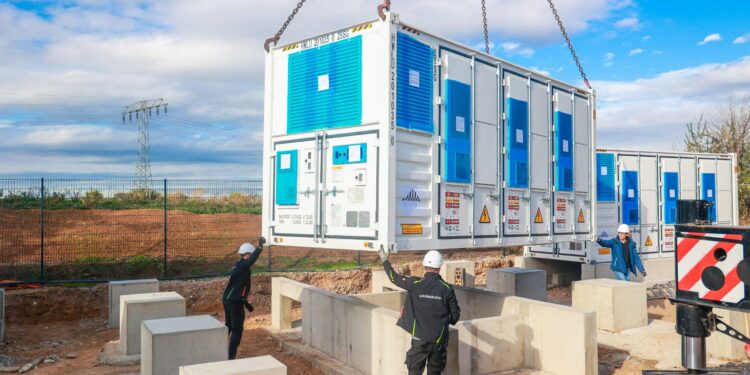MET Group has officially inaugurated Hungary’s largest battery energy storage facility, marking a significant milestone in the country’s transition toward renewable energy. The state-of-the-art installation, unveiled this week, is poised to enhance grid stability and support the integration of renewable power sources across the region. As demand for clean energy continues to grow, this new facility positions MET Group at the forefront of Hungary’s sustainable energy landscape.
MET Group Launches Hungary’s Largest Battery Energy Storage Facility Boosting National Grid Stability
MET Group has successfully commissioned a cutting-edge battery energy storage system (BESS) in Hungary, marking a significant milestone in the country’s renewable energy infrastructure. With a capacity exceeding 50 MW, this facility is designed to enhance grid flexibility, support peak load management, and facilitate greater integration of intermittent renewable sources such as solar and wind. The deployment reflects MET Group’s commitment to advancing energy transition solutions that prioritize reliability and sustainability.
- Storage Capacity: > 50 MW / 100 MWh
- Response Time: Sub-second rapid dispatch
- Grid Services: Frequency regulation, peak shaving, load balancing
- Location: Upgraded infrastructure near Budapest
| Feature | Impact |
|---|---|
| Fast Response | Improves real-time grid stability |
| Renewable Integration | Enables higher renewables penetration |
| Energy Efficiency | Reduces energy losses in the system |
This new installation is set to play a pivotal role in Hungary’s energy landscape by mitigating fluctuations inherent in renewable energy output. Furthermore, MET Group’s system leverages advanced battery management technologies and predictive algorithms to optimize performance and lifespan. Stakeholders emphasize that such initiatives not only secure energy supply but also create a scalable blueprint for future energy storage projects across Central Europe.
Innovative Technology and Capacity Details Behind MET Group’s Groundbreaking Renewable Energy Project
At the core of this landmark project is a cutting-edge battery energy storage system (BESS) that uses state-of-the-art lithium-ion technology to ensure maximum efficiency and reliability. The facility boasts a total installed capacity of 50 MW with an energy storage potential of 100 MWh, enabling it to stabilize the grid and support Hungary’s increasing share of renewable energy sources. The modular design allows for seamless scalability and rapid deployment, distinguishing it as one of the most flexible energy storage solutions in the region. Advanced control algorithms optimize charging and discharging cycles, reducing operational costs while extending the battery lifespan significantly.
Integrating a smart energy management system, the installation enhances grid resilience through real-time data analytics and predictive maintenance capabilities. Key technological features include:
- High-speed data communication networks for instantaneous response to grid fluctuations
- Advanced cooling systems that ensure optimal battery performance under extreme weather conditions
- AI-driven predictive diagnostics to minimize downtime and prevent faults
- Seamless integration with renewable power plants across Hungary
| Specification | Value |
|---|---|
| Installed Power Capacity | 50 MW |
| Energy Storage | 100 MWh |
| Battery Type | Lithium-ion |
| Expected Lifetime | 15+ years |
| Grid Integration | National Electricity Transmission System |
Experts Recommend Expanding Battery Storage to Accelerate Hungary’s Transition to Clean Energy
Industry specialists emphasize that the expansion of battery storage capacity is a critical step in enhancing Hungary’s renewable energy infrastructure. By integrating larger and more advanced battery systems, the country can better manage intermittent energy sources like solar and wind, ensuring a stable and reliable power supply. Experts highlight key benefits such as:
- Grid stability: Mitigates fluctuations caused by renewable generation variability.
- Energy arbitrage: Enables storing excess energy during low demand and releasing it during peak hours.
- Reduced carbon footprint: Promotes higher renewable energy penetration, lowering reliance on fossil fuels.
With MET Group’s recent inauguration of Hungary’s largest battery energy storage facility, stakeholders anticipate a swift acceleration toward a cleaner energy future. This facility not only acts as a proof of concept but also sets a benchmark for future projects aiming to modernize the national grid. According to analysts, strategic deployments of such systems are expected to:
- Optimize energy costs by reducing grid congestion fees.
- Support decentralized production and empower local communities.
- Enhance energy security by providing backup power during outages.
| Key Metrics | Current Status | Projected Growth by 2030 |
|---|---|---|
| Installed Battery Capacity | 50 MW | 200 MW |
| Renewable Energy Share | 12% | 40% |
| Grid Stability Index | 75/100 | 90/100 |
Wrapping Up
The inauguration of MET Group’s battery energy storage facility marks a significant milestone in Hungary’s renewable energy landscape. As the country strives to enhance grid stability and increase reliance on clean energy sources, this state-of-the-art installation stands as a critical step toward a more sustainable and resilient power system. With its capacity to store and dispatch energy efficiently, the facility not only supports Hungary’s climate goals but also sets a precedent for future investments in large-scale energy storage solutions across the region. MET Group’s continued commitment underscores the growing momentum in Europe’s transition to greener energy infrastructures.
















